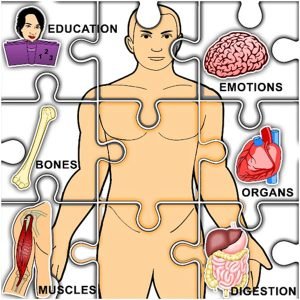- You have no items in your shopping cart
- Subtotal: AUD$0.00
Kinesiology is truly a holistic health care
PHYSICAL – EMOTIONS – NUTRITION – ENVIRONMENT
Why does Kinesiology get quick and long lasting results?
The answer is simple… a Kinesiologist looks at the whole person rather than just one part of them. For example, when someone experiences pain in their body, the solution may not be in just trying to fix it structurally. We’ve all heard of emotional pain, but does that really exist? The answer is yes. In fact, it could be not just emotional, but it could even be a nutritional issue that needs to be addressed for the body to release the pain. Have a look at this video to see Kinesiology in action.This video shows first hand how whiplash from an accident can have both emotional and chemical issues that need to be dealt with to resolve long term neck pain. Watch how the lady is amazed when Kinesiology identifies and corrects issues she didn’t even know were still affecting her.This is also why Kinesiology is gaining such a good reputation for problems traditionally helped by other practitioners including doctors, naturopath, physiotherapists and counsellors.KINESIOLOGY IS SIMILAR TO … Kinesiology is like Physiotherapy but it’s not
Kinesiology is like Chiropractics and Osteopathy but it’s not
Kinesiology is like Naturopathy but is not
Kinesiology is like Psychology and Counselling but it’s notAs Kinesiologists we just don’t look at you simply as a muscle, a mind, an organ, an energy or a nervous system. We understand that in order for a healthy and happy existence to occur the physical, bio-chemical, emotional, spiritual, mental and environmental aspects of your life must be in harmony with one another.
Kinesiology is like Physiotherapy but it’s not
Kinesiology is like Chiropractics and Osteopathy but it’s not
Kinesiology is like Naturopathy but is not
Kinesiology is like Psychology and Counselling but it’s notAs Kinesiologists we just don’t look at you simply as a muscle, a mind, an organ, an energy or a nervous system. We understand that in order for a healthy and happy existence to occur the physical, bio-chemical, emotional, spiritual, mental and environmental aspects of your life must be in harmony with one another.How Kinesiology Is Similar To Physiotherapy
Kinesiology is similar to Physiotherapy as Physiotherapists work to reactivate or train the muscles to perform the movements they are designed for. A Physiotherapist will use exercises, machines, massage and stretching techniques to retrain the muscle.A Kinesiologist places the muscles in specific positions to isolate them to identify which muscles work and which don’t. If a muscle does not work correctly, the person will feel as if they have no, or limited, strength in it. The Kinesiologist then uses muscle testing to identify special reflex points, emotional memory triggers, nutrition and stretching to reset the reflexes that turned off neural circuitry to the muscles, tendons and ligaments. The structural changes from a Kinesiology treatment can usually be felt instantly.How Kinesiology Is Similar To Chiropractic And Osteopathy
Kinesiology is similar to Chiropractic and Osteopathy, except that a Kinesiologist does not use any thrusting force to make a correction. In fact, Kinesiology grew out of a form of Chiropractic. In most cases a Kinesiologist typically uses either a very gentle manipulation via the use of various reflex points, nutritional changes, or even emotional stress release techniques similar to counselling, combined with the body’s own breathing reflex, to achieve results.These techniques are safe as they do not force bones into place. Kinesiology techniques correct the muscle tension that holds the bones in place and helps them move back and forth. Most of the time bones are not actually out of place. They are simply not sitting correctly in place and are interfering with the nerve and proprioceptive messages to the muscles and organs.When a bone is actually out of its place the Kinesiologist will refer the person to a Chiropractor or Osteopath as this is their expertise.How Kinesiology Is Similar To Naturopathy
Kinesiology is similar to Naturopathy. A Naturopath will look at the illness and choose supplements that have the ‘ingredients’ to return the person to better health.Most Kinesiologists do not have access to practitioner-only products that are restricted by the Therapeutic Goods Administration but will use similar knowledge of nutrition. When combined with a skilful knowledge of muscle testing, this can identify the best nutrition or supplements available to help the person. With the help of accurate muscle testing fewer supplements are needed providing a saving to the client’s hip pocket.It takes more than just a basic knowledge of muscle testing to accurately evaluate the best nutritional changes required, be it food, supplementation or dietary adjustments. A well-trained Kinesiologist has the ability to test to identify if the nutrition is of benefit, and whether there is any reason the person should not take it. For example, there may be an ingredient in the supplement that may cause an adverse reaction, such as a filler or binder added during the manufacturing process.The quality of ingredients can also be a big factor to the success of the treatment. For example, a supplement may use synthetic ingredients that the body has difficulty utilising, or a calcium supplement may use dolomite, which is natural, but sometimes can’t be broken down and absorbed efficiently. Kinesiology can decipher which food or supplements are the most beneficial for the individual client.How Kinesiology Is Similar To Psychology and Counselling
Kinesiology is similar to Psychology and Counselling as these fields require good listening skills. All three disciplines: the Psychologist, Counsellor and Kinesiologist use various talk therapy techniques to draw out and decipher the triggers causing the problems.There are certainly differences. A Psychologist and Counsellor have more involved training in this area. A good Kinesiologist has counselling training but also has muscle testing as the tool to access and interact with the bio-computer (the brains feedback system). This bio-computer helps identify the problem source and what may be a priority trigger for the person’s current mental health.A Psychologist and Counsellor rely on their listening skills to make the most out of the high level of knowledge they have. If the Psychologist and Counsellor are distracted or miss a major key point or two then they may be totally on the wrong track and take quite a long time to help the client. This could be months or even years. The same may happen if the client does not reveal the problem or the truth. Muscle testing helps the Kinesiologist stay on track to speed up the treatment so that the issues can be resolved very quickly. As hard as this is for some people to understand, Kinesiology can and does have positive benefits on psychological states.The use of muscle testing allows the Kinesiologist to continually monitor the person’s own built-in ‘truth monitor’. The truth monitor is part of the person’s own self defence mechanism. A person’s first instantaneous reaction to stress, and memory of stress, is that the muscles turn down (go weak) for a split second acting like a ‘truth monitor’. When the person and the Kinesiologist discuss the issue, the truth monitor activates when stress occurs. The Kinesiologist identifies this via the muscle test and uses counselling techniques to discuss the issue with the person. This helps keep the practitioner and client on track and encourages a faster route to recovery.If the issues are too involved or complicated the Kinesiologist can quickly identify the problems via muscle testing the bio-computer, then refer the client to a Psychologist or Counsellor for the appropriate treatment. It is always recommended that a Kinesiologist refers clients with a diagnosed mental health issue to a licensed professional so that they can work as a team to help support the client’s needs.This article was written by Danny Liddell
 Learning his trade under some of the biggest names in Kinesiology, Danny has been a Kinesiologist since 1995. Danny is the Principal of Kinesiology Schools Australia, Brisbane Campus. Danny has taught at most of the major health colleges in Brisbane including Endeavour College, Australian Institute of Applied Sciences and Kinesiology Schools Australia, teaching Touch For Health, the Professional Kinesiology Program, Hyperton-X and the Neural Organisational Therapy.As well as being a Senior Faculty Member of ICPKP, Danny is the author of ‘How Kinesiology Works’ and holds a Certificate IV in Small Business Management and a Diploma in Business and a Diploma in Training and Assessment Strategies. This brings a good strength to the college where he provides students with extra help to build their Kinesiology business to be successful.
Learning his trade under some of the biggest names in Kinesiology, Danny has been a Kinesiologist since 1995. Danny is the Principal of Kinesiology Schools Australia, Brisbane Campus. Danny has taught at most of the major health colleges in Brisbane including Endeavour College, Australian Institute of Applied Sciences and Kinesiology Schools Australia, teaching Touch For Health, the Professional Kinesiology Program, Hyperton-X and the Neural Organisational Therapy.As well as being a Senior Faculty Member of ICPKP, Danny is the author of ‘How Kinesiology Works’ and holds a Certificate IV in Small Business Management and a Diploma in Business and a Diploma in Training and Assessment Strategies. This brings a good strength to the college where he provides students with extra help to build their Kinesiology business to be successful.